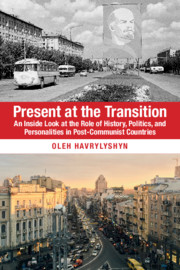 Present at the Transition
Present at the Transition from Part II - Choice of Strategy
Published online by Cambridge University Press: 04 May 2020
The old debate in history on how much individual leaders matter compared to underlying forces that move things is explored in this chapter for the post-communist transition episode. Key leaders in Central Europe, like Havel and Klaus in Czechoslovakia, and Wałęsa, Mazowiecki, and Balcerowicz in Poland, may have had the historical force of a return to prewar Europe behind them, but it was their strong commitment that resulted in seizing the opportunity of 1989’s critical juncture and moving fast to consolidate Big Bang reforms before old and new vested interests could capture the process. In Bulgaria, Romania, and even more so farther east, remnants of the old elite did not have this commitment and used the excuse of historical inertia to slow the process to their personal benefit. The best example of this was the almost complete lack of reforms in the three years of Kravchuk’s presidency in Ukraine. Some exceptions on both sides existed – Slovakia and Serbia hesitated despite the European heritage, while Yeltsin in Russia without this incentive initially tried to leverage this critical juncture into real reforms led by a capable and committed reformer Gaidar – the power of the old-guard interest soon led to aborting this Big Bang effort.
To save this book to your Kindle, first ensure no-reply@cambridge.org is added to your Approved Personal Document E-mail List under your Personal Document Settings on the Manage Your Content and Devices page of your Amazon account. Then enter the ‘name’ part of your Kindle email address below. Find out more about saving to your Kindle.
Note you can select to save to either the @free.kindle.com or @kindle.com variations. ‘@free.kindle.com’ emails are free but can only be saved to your device when it is connected to wi-fi. ‘@kindle.com’ emails can be delivered even when you are not connected to wi-fi, but note that service fees apply.
Find out more about the Kindle Personal Document Service.
To save content items to your account, please confirm that you agree to abide by our usage policies. If this is the first time you use this feature, you will be asked to authorise Cambridge Core to connect with your account. Find out more about saving content to Dropbox.
To save content items to your account, please confirm that you agree to abide by our usage policies. If this is the first time you use this feature, you will be asked to authorise Cambridge Core to connect with your account. Find out more about saving content to Google Drive.